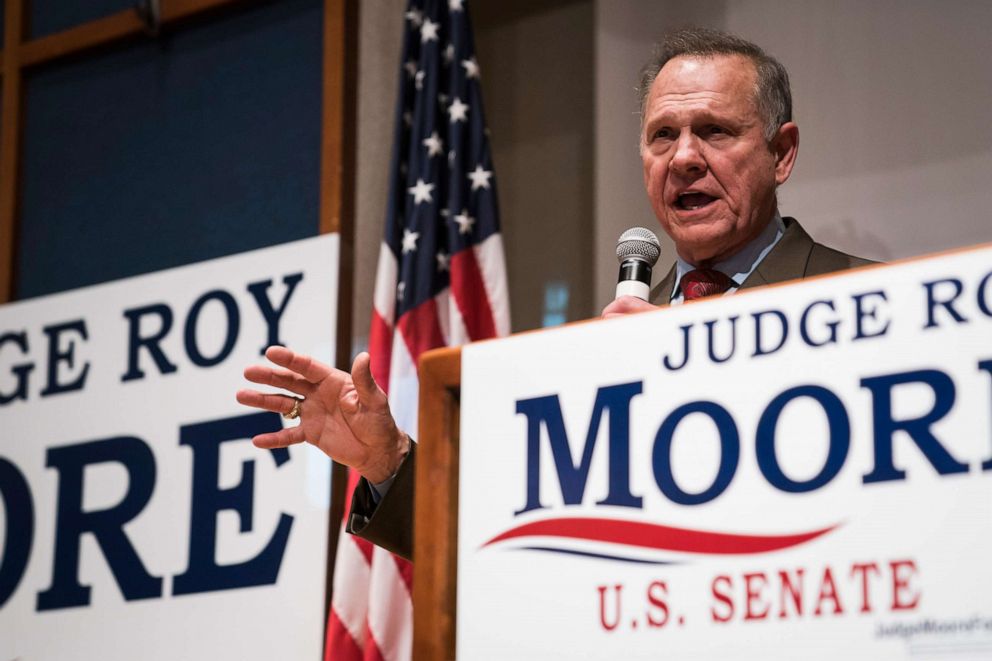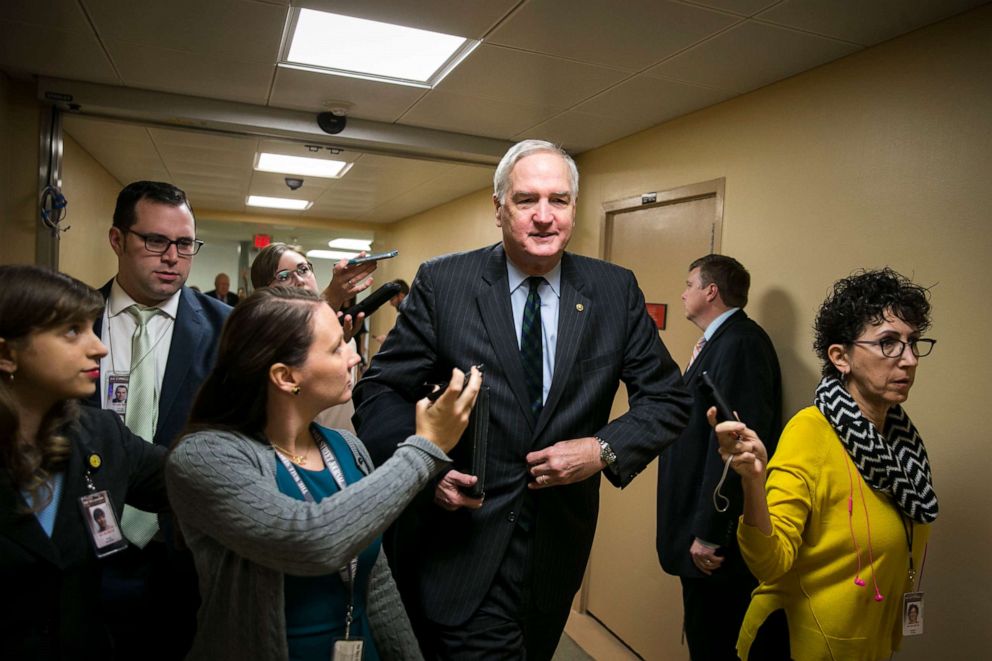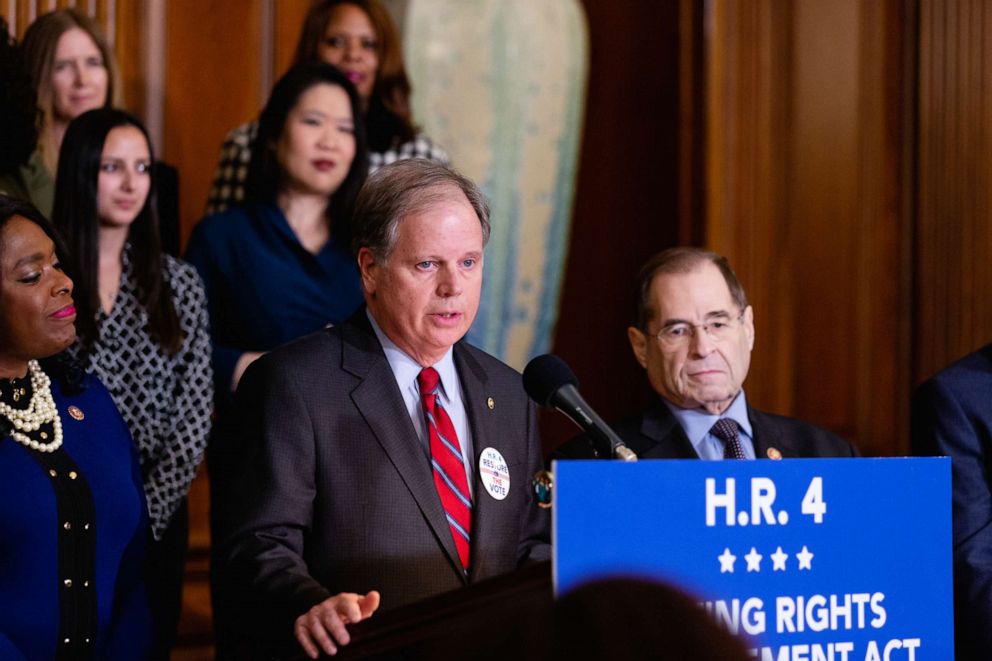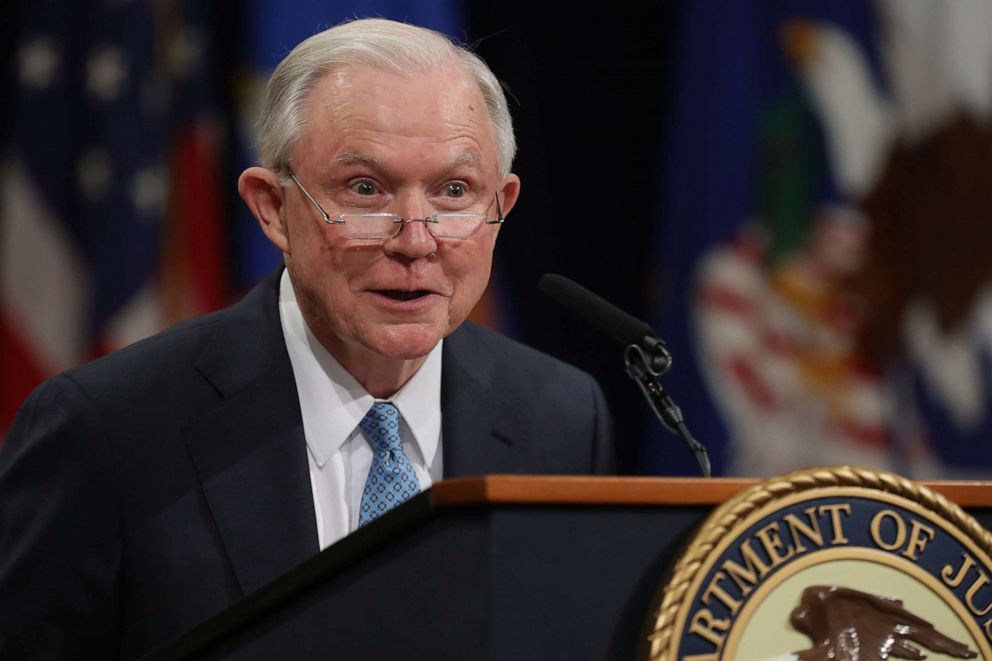Despite cold shoulder from Trump, GOP firebrand Roy Moore announces 2020 bid for the US Senate
His 2017 candidacy was stymied by accusations of sexual misconduct in the 1970s.
Judge Roy Moore, the controversial conservative firebrand who narrowly lost a U.S. Senate special election in Alabama to Democrat Doug Jones in 2017, announced Thursday he will again compete for the GOP nomination to challenge his former rival in 2020 – setting up a rematch in one of this cycle’s most consequential races.
"I'm ready to do it again and yes, I will run for the United States Senate in 2020," Moore said in a press conference in Montgomery announcing his second Senate bid Thursday.
"Can I win? Yes, I can win," he added in response to a reporter question.

Moore re-enters the political arena roughly a year and a half after seeking to replace former Alabama Sen. Jeff Sessions, who vacated the seat to become President Donald Trump’s attorney general. Moore ultimately lost by more than 22,000 votes to Jones in a major blow to Republicans.
The former Alabama Supreme Court Chief Justice initially surged onto the national stage after defeating Trump-backed state Sen. Luther Strange in the GOP primary, which was seen as one of the earliest tests of the president’s political influence.
But his candidacy was stymied by the emergence of multiple accusations of sexual misconduct in the 1970s, which included inappropriate contact with underage women when he was in his 30s, during the general election campaign. He has denied the allegations and was never charged or investigated.

With the experience of a failed Senate run under his belt, Moore signaled that he would do things a little differently this time around, telling reporters, "I would like to make more personal contact with people ... I'd like to get out personally, hold parties, more personal contact and travel the state. The people of Alabama know me."
Jones’ victory in 2017 foreshadowed the rise of the "blue wave" in the Trump era – and was an early signal of the limits of the power of his presidential endorsement. But as the first Democrat elected to the Senate from Alabama in 25 years, he is now considered one of the most endangered incumbents up for re-election, and political experts have cast the race as a toss-up.
The GOP currently controls the Senate 53-47 over Democrats, but to ensure it can hold on to the chamber in 2020, the party is taking aim at the Senate seat in deep red Alabama which shows even deeper tints of red in a presidential cycle. The state's GOP primary is on March 3.
Jones immediately sent an email to supporters after Moore's press conference, writing, "It's clear that my opponent will either be an extremist like Roy Moore or another extremist handpicked by Mitch McConnell. Putting another extremist in the Senate will only make things worse."
Prior to Moore announcing he's entering the Republican primary, Jones didn't appear to show any signs of concern.
"I'm not going to give an 'if' answer, especially not with THAT guy," he told ABC News only hours before Moore made his announcement.
Although Jones is battle-tested, the contest is expected to be one of the most closely-watched due to Jones’ vulnerability and the eagerness of the Republican bench already lining up to oust him.
Moore is entering a crowded primary, with four other candidates already competing for the nomination and the chance to take on Jones, including Rep. Bradley Byrne, former Auburn University football coach Tommy Tuberville and state Rep. Arnold Mooney. Alabama Secretary of State John Merrill filed official paperwork with the FEC to run for the seat, and is set to make a formal announcement next week.
Moore’s uphill climb also includes a potential rivalry with Sessions, who has not ruled out a bid for his former seat.In early May, the former attorney general said during a live interview at the SALT conference, "I haven't made a formal announcement about the senate race, but I am interested in the issues … I'd love to see us bring more intellectual heft behind those positions. I think it exists, and maybe I can contribute some in that."
Sen. Richard Shelby, the state’s other sitting senator, who has talked to Sessions about running again, also said the day before Moore announced his bid, "I don't think [Sessions has] ruled it out. I've talked to him about it. I think if he ran he would be a formidable candidate."
"I have not encouraged him to run but he's a friend and if he ran I think he'd probably clear the field," he added.
Back in 2017, Moore secured Trump’s coveted endorsement only a week shy of the election, and while he never campaigned alongside him, the president urged voters at a campaign rally held just days before the election took place and just over 50 miles from the Alabama state line to back Moore.
"We want people that are going to protect your gun rights, great trade deals instead of the horrible deals. And we want jobs, jobs, jobs. So get out and vote for Roy Moore," Trump said during a December 2017 rally in Pensacola, Florida.

But as Moore teased a political comeback over the last couple of months, the support he once boasted from within his own party has thinned, as Trump and other top Republicans appear wary of his candidacy and have even warned him against launching a bid.
Last month, Trump asserted that Moore could cost the GOP the crucial Senate seat.
"If Alabama does not elect a Republican to the Senate in 2020, many of the incredible gains that we have made during my Presidency may be lost, including our Pro-Life victories," the president tweeted. "Roy Moore cannot win, and the consequences will be devastating...Judges and Supreme Court Justices!"
Moore fired back at the president during an interview with Politico, in which he said, "The president doesn’t control who votes for the United States Senate in Alabama. People in Alabama are smarter than that. They elect the senator from Alabama, not from Washington, D.C."
He also said that despite Trump's opposition, he's confident he would successfully capture the GOP nomination again.
"They know I'll win," he added. "That's why they're upset."
On Thursday, he struck a more conciliatory tone about his relationship with Trump, telling reporters, "I'm not going against President Trump at all. I support President Trump. I'll vote for President Trump. Whether he votes for me or not, we'll see. I'm sure he will when I get into the general election."
But Trump's son, Donald Trump Jr., responded to Moore's announcement on Twitter, writing, "This is pure fake news. I can assure everyone that by running, Roy Moore is going against my father and he’s doing a disservice to all conservatives across the country in the process."
Republicans worry Moore’s entrance into the race could potentially muddy the waters for the party's hope to flip the seat – and could possibly elevate Jones’ chances to earn a second term.
Senate Majority Leader Mitch McConnell, who previously ceded to Alabama voters to decide if Moore should be in the Senate before the 2017 election, said after the announcement, "We'll be opposing Roy Moore vigorously."
Shelby told reporters on Capitol Hill Wednesday that he would not support Moore if he decided to run again.
"It'd be up to the people of Alabama," he said. "There are a lot of other people that will hopefully be running … I would not support him."
"I think Alabama could do better and he would be a disruptor," Shelby continued. "I think we can win that seat back."

The top aide of Senate Republicans’ campaign arm also previously signaled that they would be against a Moore bid.
"There’s a lot about Roy Moore that still needs to be examined, especially on the financial element, it’s a tangled web," Kevin McLaughlin, the executive director of the National Republican Senate Committee, told the New York Times, before calling himself “A.B.R.M — Anyone but Roy Moore.”
ABC News’ Trish Turner contributed to this report.




